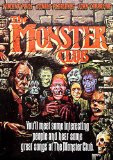| Reviews & Columns |
|
Reviews DVD TV on DVD Blu-ray 4K UHD International DVDs In Theaters Reviews by Studio Video Games Features Collector Series DVDs Easter Egg Database Interviews DVD Talk Radio Feature Articles Columns Anime Talk DVD Savant Horror DVDs The M.O.D. Squad Art House HD Talk Silent DVD
|
DVD Talk Forum |
|
|
| Resources |
|
DVD Price Search Customer Service #'s RCE Info Links |
|
Columns
|
|
|
Monster Club, The
Reviewer's note: Since this review of The Monster Club is based on a screener check disc sent by Scorpion, DVDTalk policy is to offer no ratings or comments on the A/V quality of the transfer, or the included bonuses, until a final street version of the title is sent for perusal--a pity since there's quite a bit to talk about in those departments.... Should a final copy arrive--which Scorpion never seems to do, alas--the review will be accordingly amended.
I'm always leery of a title where everyone asserts, "It's really not as bad as everyone says it is." Scorpion Releasing has released The Monster Club, the 1980 U.K. horror anthology outing sorta/kinda/not really from Amicus, produced by Milton Subotsky, directed by Roy Ward Baker, and starring Vincent Price, John Carradine, Donald Pleasence, Stuart Whitman, Richard Johnson, Barbara Kellerman, Britt Ekland, Simon Ward, James Laurenson, Anthony Valentine, Patrick Magee, Lesley Dunlop, and Anthony Steel. A trio of horror-themed vignettes, loosely based on R. Chetwynd-Hayes' short stories, tenuously connected by a framing device that sees horror icons Price and Carradine hanging out at The Monster Club discotheque while marginal U.K. bands rock out, The Monster Club is one of those movies that nobody much cared for when it first came out, but which has subsequently received "re-evaluation" from a small, vocal cult. They were right the first time around. As for that transfer and the extras, well....
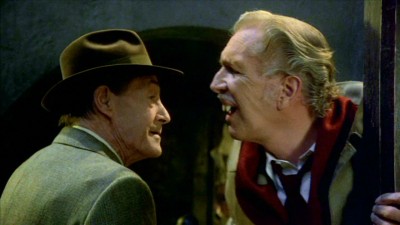
A foggy corner on a forgotten back street in London. Perusing a book store's window display of his latest work, horror author R. Chetwynd-Hayes (John Carradine) is politely accosted by fatigued passerby and vampire, Eramus (Vincent Price), who figuratively and literally puts the bite on Chetwynd-Hayes for some much-needed nourishment. Chetwynd-Hayes is lucky, though, that Eramus is a fan of the writer's work; the vampire only bit him lightly, and not enough to turn him into the undead. As payment for the light snack, Eramus offers Chetwynd-Hayes something no author can refuse: promising material for a new book. Eramus escorts the bemused Chetwynd-Hayes to the Monster Club, a disco where real monsters of all kinds party down to the sounds of The Viewers, B.A. Robertson, Night, and The Pretty Things bands. As if this wasn't terrifying enough for the curious author, Eramus then settles in and tells Chetwynd-Hayes three stories of the macabre (well...two, really; one is "told" via a projected movie at the club).
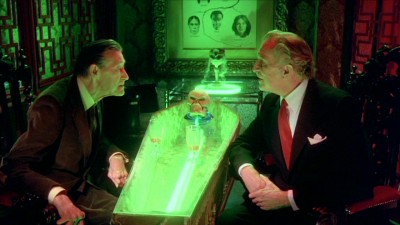
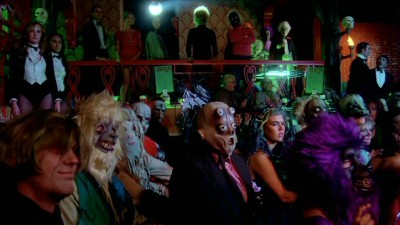
In the first vignette, slimy little toe rag George (Simon Ward) convinces his willing girlfriend Angela (Barbara Kellerman) that she should answer an advertisement for a secretarial position in the hopes of stealing from the employer. When Angela meets Mr. Raven (James Laurenson), she doesn't know he's a "shadmock," a creature whose whistle is deadly. Then again, she doesn't need to know that since his corpse-like looks are off-putting enough; however, George's continued pressure keeps her on the job, until the pathetic, doomed Raven falls in love with Angela...with horrifying results. Next, low-budget horror movie producer Lintom Busotsky (Anthony Steel), showcases his latest autobiographical effort. In the movie, young Busotsky (Warren Saire) is a shy, lonely boy who is unable to play with his sleeping father (Richard Johnson) during the day, and who only has a few minutes with his father at night, before he goes out "on the job." Young Busotsky's mother (Britt Ekland) tries to help the boy, but his loneliness and curiosity take over when Pickering, Chief of the B-Squad (Donald Pleasence), posing as a clergyman, tells the boy to go downstairs and wake his father. The boy discovers his father is really a vampire, and that Pickering and his bureaucratic goons (Anthony Valentine, Neil McCarthy) are going to stake his father...with surprising results. Finally, Eramus tells the story of another movie director, Sam (Stuart Whitman), who is in dire need of a mysterious, secluded village for location work on his next horror film. Driving around the country on his own, Sam comes across an old sign off the expressway for Loughville. Driving the back roads, Sam crosses through a strange mist and encounters the deserted village...or is it? The local innkeeper (Patrick Magee) makes it clear Sam isn't leaving town, and soon, the whole village of creepy inhabitants surround Sam, locking him in his room. Only little Luna (Lesley Dunlop), seems to want to help Sam escape, but will she be able to...when the ghouls come out at night to feed?
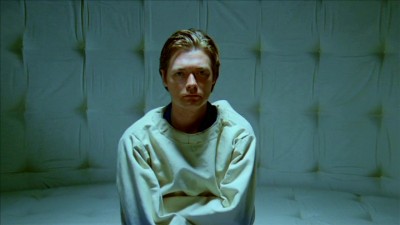
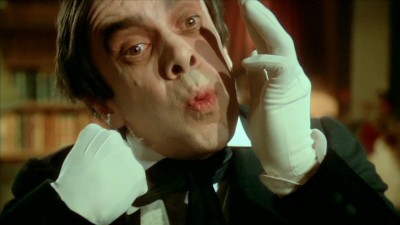
I'm certainly no expert on Amicus anthologies, but I've enjoyed most of them over the years (The House That Dripped Blood and Asylum are two favorites of the genre and studio). However, I never saw The Monster Club before this disc--partly because it never played in theaters here in the States (with that cast I would have been first in line at my local theater), and since subsequently I heard so many unflattering things about it from critics and friends who saw it on video. There's a fairly complicated history to The Monster Club's production, at least in terms of backstory on the demise of Amicus, which quite frankly is more interesting than the movie itself. But briefly, producer Milton Subotsky, who with Max J. Rosenberg founded Amicus in 1960 to compete with Hammer, broke away from the company in 1975 or 1978 (several sources give varying accounts), creating his own production company of which The Monster Club was the only horror outing that he hands-on produced. Hoping to make an anthology that not only referenced the more discreet air of horror found in earlier Amicus entries, but that also featured musical groups for "the kids" in the audience, as well as icons Vincent Price and John Carradine for the older crowd (...that is, after Christopher Lee and Klaus Kinski turned him down), The Monster Club wound up pleasing no one when it bowed in the U.K. in 1980, with its box office and critical failure not actually ending the era of pre-slasher British horror movies (that movement had petered out as a significant force long before), but at least providing a neat, convenient date on the timeline for writers to reference.
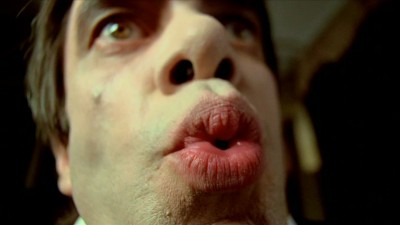
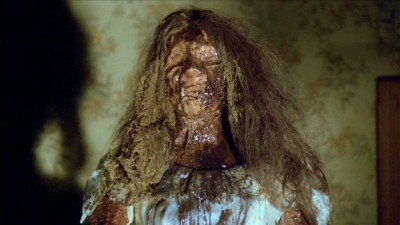
There seems to be two common threads running through the newer, more positive reviews I've read about The Monster Club. First, it didn't play here in the States--and thus, arguably, achieve a much bigger following and subsequent name recognition--because of the gorier requirements of philistine U.S. distributors and exhibitors jacked-up to the likes of slash-fests Halloween and Friday the 13th. And second, The Monster Club was misunderstood when it bowed, and that it's actually quite nice and cute and innocent and charming, and much better than people give it credit for because so many talented people were associated with it, and more importantly, because it's really trying to be good. Fiddle-faddle. As to the first point: if any U.S. distributor thought The Monster Club was even remotely viable in terms of ticket sales, they'd have snapped it up for a song. With that name cast--particularly Pleasence, who was still hot in 1980 after Halloween--any distributor worth its salt would have invented a campaign that made The Monster Club look like Last House on the Left...if there was at least a kernel of a horror movie to work with here (since when did the overall quality of a movie ever stop it from being picked up and distributed, if it was deemed suitably exploitable?). The fact is, nobody wanted The Monster Club because it was so marginal and familiar and limp, there was no way to sell it into mainstream profitability, regardless of the ballyhoo (look what happened to Price's House of the Long Shadows, with even bigger heavyweight co-stars, Christopher Lee and Peter Cushing).
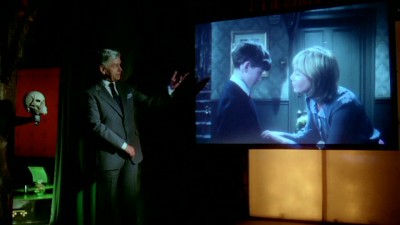
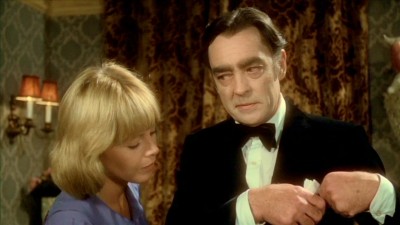
As to giving The Monster Club the benefit of the doubt because Price and Carradine are in it, and Amicus alumni are involved, and because it's genial and goofy and good-natured and slow, instead of gory and crude and flashy, which means it must be somehow "noteworthy" at this time frame in movie horror for going against the grain...well, bullsh*t. A movie plays well or it doesn't, nothing more or less; nobody should give points for "trying hard" or "good intentions," especially when pros like these are involved. All of the main cast and crew in The Monster Club have numerous critical successes to their names; they don't need one more title that doesn't really work graciously added to those lists just to be "nice," or worse, retroactively manufactured through "re-evaluation" in some misguided effort to "honor" their collective work and memory. Despite that stellar cast and one or two promising ideas, The Monster Club, in the end, isn't a very good horror anthology, and no amount of "good will" is going to change that.
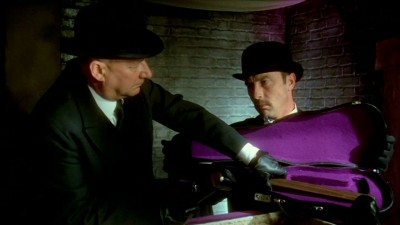
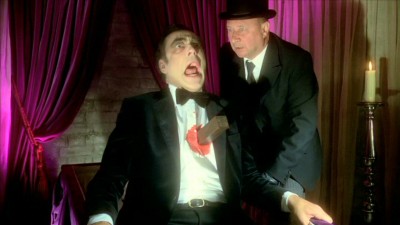
The first "Shadmock" segment is summed up perfectly by the opening shot of Simon Ward's inexpressive, bored close-up, one that neatly says: "The promise of Young Winston has not been fulfilled." An obvious twist on the Beauty and the Beast story, this segment's biggest drawback is supposedly its most "terrifying"--the whistle. Whether or not you find the idea of a killer, melting whistle scary or cinematic (I don't) is ultimately beside the point here when you actually hear it in the movie: it sounds pathetic (who designed that effect, because it's laughably lame, as is the "monster ball" where see-through plastic masks, made from what look like milk jugs, hilariously substitute for a lack of any monster makeup on the actors). Too bad, too, since James Laurenson does a fairly nice job with his monster-with-a-poetic-romantic-soul. I'll go against the tide and admit I was having the most fun, in the beginning, with the much-despised second "vampire" segment--particularly with that infectious gypsy music score and old favorite Richard Johnson hamming it up delightfully with a funny Lugosi accent and plenty of eye-wagging and double takes. However, an odd see-sawing in tone with the young boy (why spend so much comparative time on the bullying angle?), zero support from hopeless Britt Ekland, and worst of all, a "parody" of all those British "special flying squad" movies that went absolutely nowhere (Pleasence does score when he calls himself a "departmental legend,"), sinks any hope I had for the segment. The final, unforgiveable insult of course is one that many reviewers have mentioned: Johnson's "twist" ending reveal...which incorporates what has to be one of the sorriest excuses for a punch line I've encountered in this kind of light fare, effectively eliminating any minor residual good feelings I had with the segment. Finally, the "Humgoo" segment (don't ask) bears far too close a resemblance to Subotsky's classic, The City of the Dead (am I crazy...or is that even the same inn and church/graveyard set from that earlier iconic horror outing?) without any of the resulting pleasures. Stuart Whitman is fine as the gruff, out-gunned director, but director Baker's ham-handed, flat-footed direction here robs the segment of any true suspense (by the way: if the ghouls can't cross the consecrated ground of the church, how did they dig up the coffins in the cemetery...which of course is consecrated ground?). And I'm apparently alone in not admiring the brief expositional segment where Whitman learns the backstory of the village's terrible pact with the ghouls through a vicar's illustrated book--yes, the illustrations are incredible (and incredible money-savers for this low-budget outing), but I'm watching a movie, not visiting an art gallery. It's a static, energy-draining interlude that doesn't help an already compromised outing. As for the ending and its remarkably inept "surprise" twist, any five-year-old could see it coming a mile off.
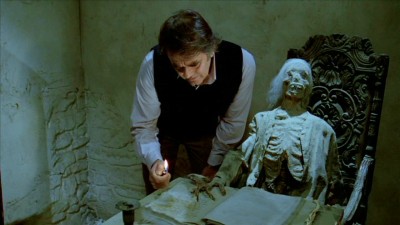
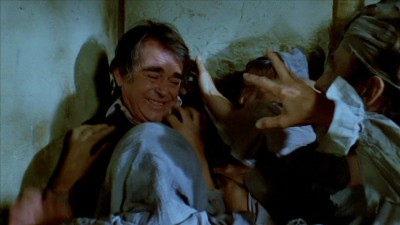
As poor as these three segments are, the most woeful aspect of The Monster Club is the one element everyone else apparently agrees upon is the one I'm supposed to most cherish: the wrap-arounds with Price and Carradine. Desultorily shot and performed (Carradine in particular looks half-asleep), with endless juvenile jibber-jabber about the monster genealogy (Price can barely get it all out), these inbetween bumpers only interrupt the movie's already herky-jerky flow, adding precious little levity with their silly, ineffectual in-jokes and puns. The musical numbers, unintentionally amusing not only for their own questionable worth but also because they're routinely interrupted with shots of extras dancing around in dime-store masks, do nothing to help the movie's overall draggy feel. By the movie's end, when Price sanctimoniously starts ripping into humankind, making a case for man being the worst monster of all (as he obviously keeps looking for the cue cards), I had had more than enough of amateur hour The Monster Club: tired, familiar horror stories lacking any verve or suspense; lots of dodgy performances, excruciating musical interludes, a decidedly unamusing, lame framing device...and now a downbeat, cliched message to send me out the theater doors? No wonder no one liked this when it first came out....
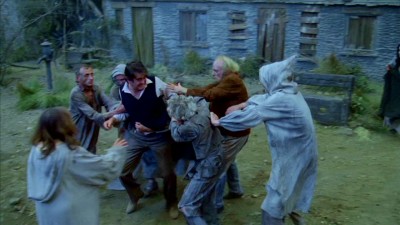
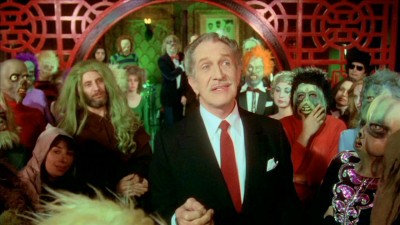
The DVD:
The Video:
See note above.
The Audio:
See note above.
The Extras:
See note above.
Final Thoughts:
No one is dying to get in here (yes...that's exactly the kind of half-assed "joke" you'll get in this mess). There's a reason The Monster Club didn't get a U.S. release back in 1980, and it had nothing to do with Halloween or Friday the 13th: it just wasn't any good. Tired, familiar scripting, flaccid direction, some mighty bored performers, and a cheapjack production spells the end of U.K. horror in The Monster Club. A rental for horror completists only...but everyone else has been warned.
Paul Mavis is an internationally published movie and television historian, a member of the Online Film Critics Society, and the author of The Espionage Filmography.


|
| Popular Reviews |
| Sponsored Links |
|
|
| Sponsored Links |
|
|
| Release List | Reviews | Shop | Newsletter | Forum | DVD Giveaways | Blu-Ray | Advertise |
|
Copyright 2024 DVDTalk.com All Rights Reserved. Legal Info, Privacy Policy, Terms of Use,
Manage Preferences,
Your Privacy Choices | |||||||









